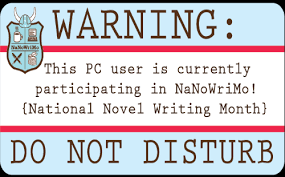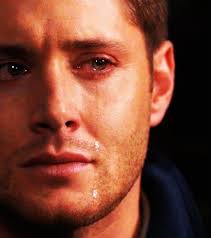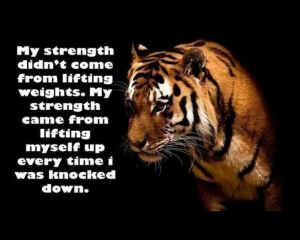 I reached a milestone yesterday: I finished a novel.
I reached a milestone yesterday: I finished a novel.
Let me explain. Yes, if you look on the sidebar, you’ll see I have novels for sale. And yes, they are finished novels. So what’s the big deal?
A little something called a slump. Or writer’s block. Take your choice.
A few years back, as I was writing my fourth novel about Lyle Villines (part of the Rural Empires setting with a working title of Hillbilly Hunt), I was shopping the novel Startup around to agents in New York. One of the submissions was to Aaron Priest, who rejected it, but didn’t send me a form rejection. He said that he loved the writing, but didn’t feel like anything happened for about the first one hundred pages.
Knowing it was against etiquette, I wrote back, asking if he would take another look (all while pointing out I knew it was against etiquette) if I rewrote that first part. The answer came from an assistant, who said she would read the rewrite, and if she judged it good enough, she’d forward it to Mr. Priest.
Fair enough. More than fair, in fact.
Long story short, I was rejected again. And I could see no way around it.
Now, to be fair, Mr. Priest did point out, in his original rejection notice, that this was his opinion only and another agent might well pick it up.
But I had stars in my eyes. Aaron Priest is Robert Crais’s agent—and Robert Crais is one of my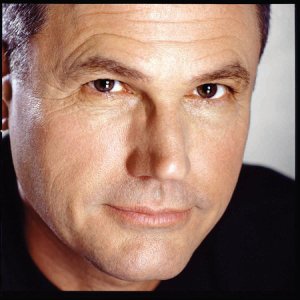 favorite authors. Who wouldn’t want to share an agent with one of your heros?
favorite authors. Who wouldn’t want to share an agent with one of your heros?
The second rejection did something to me, and in the ensuing years, writing has been hard to do. I know it’s mental, that I need to find a way around it. Add to that the fact the novel I finished is a mystery—my first—and that compounded everything. I’ve never written a mystery, and they require some finesse. You don’t want to give it away, but you don’t want it to be impossible for the reader to solve, either. It’s a fine line you have to walk.
I kept getting closer and closer, but I’d write a passage or two, then stop for months (or longer) before I went back to it. I had to drag the last quarter or more of the novel out kicking and screaming.
Then, last week, my mentor died. I wrote about him in my last post. I won’t revisit all that, but I will say this: when Dusty Richards died, he’d written over 160 novels.
Let that sink in for a minute. One hundred and sixty.
Dusty’s philosophy? Keep writing.
No matter what happens in your life, keep writing. You’re a writer, so write. It’s that simple. He cranked out three or four books a year that way. Yes, they were westerns and some of them were short. But not all of them. Not by any means.
His dying changed something in me, something more than what happens when you lose someone who means that much to you. I realized that all the people Dusty had ever encouraged to keep writing were his legacy. And that most definitely included me.
I had to make him proud of the time he’d invested in me and others. Yes, many of them no doubt gave up. Make no mistake, this is a tough business, and you have to grow a thick skin. You’ll see far more rejection than you will acceptance.
But, as Dusty admonished so many budding writers, keep writing. Why? Because it’s your dream. Not everyone is cut out for this. Heck, not everyone who writes should be doing it. Let’s be honest here. But many, possibly most, are. And even those who can’t write very well yet will improve if they fall in with the right people, people who give them constructive criticism and encouragement.
 And above all, keep writing.
And above all, keep writing.
Chances are, if you keep at it, you’ll run into a situation similar to mine, where you hit a wall and have trouble putting words on paper. Maybe life interferes. Maybe you get sent to Eastern Europe to spy on the Russians (if you do, mine that shit for stories). Maybe you have your first child. Maybe someone important to you dies. Maybe the rejection notices keep piling up and you wonder if it’s worth it to keep doing this.
Whatever the cause, for some reason, you can’t write. It doesn’t happen to everyone, but it happens to enough of us that there are endless articles about it and methods to deal with it.
The simplest solution is to do as Dusty told so many of us.
Keep writing.
I don’t care if it’s recipes, or crap you delete the next day, a frown of disgust on your face. And maybe you do it again the next day. And the next. And the next.
The point is, you’re doing something creative, and eventually it’ll turn into something you read, then nod to yourself and think, I’m keeping this.
It has taken me two, maybe three years to finish Animal Sacrifice, despite knowing, in general, how it was supposed to end (if your read this blog regularly, you’ll know I’m what’s called a pantser—I don’t outline my novels). I wrote some other things in between. I have a couple other novels started, and I managed to crank out a few short stories to keep the creative juices flowing at least to an extent.
But Animal Sacrifice sat there in its file, mocking me, it seemed. I knew what needed to happen, but getting the words out was all but impossible.
And yet, I kept writing.
Why?
Well, I have four finished novels prior to this. That’s proof I can do it. And it means I can do it more than once. Plus, I believe in this story, think it’s a good one, and it needs to see the light of day. Yes, there will be rewrites to turn it into a real mystery a toddler can’t solve in the first twenty pages, but the straight-line story is there, and it’s a good one. I say that without ego.
But I also saw my mentors, Dusty and Velda Brotherton—the two who started the writing group I’m a member of—turning out books, no matter what went on in their lives. Dusty spent a month in the hospital with pneumonia last spring.
He kept writing once he was out.
Velda has lost her husband, and her health has put her in a wheelchair.
She keeps writing.
That’s inspiration, folks. That’s drive.
That’s what we need to emulate.
I finished my novel, regardless of how hard it was to write. So go out there and finish yours, and  finish the one after that, and the one after that, ad infinitum.
finish the one after that, and the one after that, ad infinitum.
Keep writing.
Later,
Gil
 serious about the writing, ready to improve my craft. I can’t remember now how I heard about this particular group, at least not this time. I’d heard of it once before from a friend, but I guess I wasn’t ready for it yet, wasn’t ready to let strangers see my work.
serious about the writing, ready to improve my craft. I can’t remember now how I heard about this particular group, at least not this time. I’d heard of it once before from a friend, but I guess I wasn’t ready for it yet, wasn’t ready to let strangers see my work.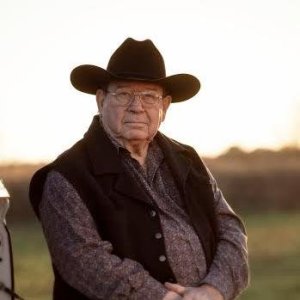 I’d known of Dusty since I was a teenager. I’d worked an FFA rodeo once in I think it was tenth grade, and Dusty was the announcer. He was a local celebrity even then, appearing on a regional morning show, doing the farm report. He’d been a biology teacher at my alma mater, Huntsville High School, as well as a field man for Tyson, traveling around to the chicken farms, helping them raise better chickens.
I’d known of Dusty since I was a teenager. I’d worked an FFA rodeo once in I think it was tenth grade, and Dusty was the announcer. He was a local celebrity even then, appearing on a regional morning show, doing the farm report. He’d been a biology teacher at my alma mater, Huntsville High School, as well as a field man for Tyson, traveling around to the chicken farms, helping them raise better chickens.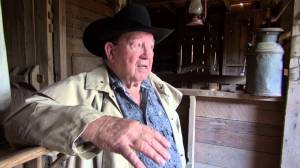 he could be, she was the only one who could control him, the only one who could rein him in. She was a quiet influence in his life, his bride of fifty-six years. While he was the center of attention, Pat would sit off to the side, reading her romance novels, the only kind I ever saw in her hands. Bodice rippers, as they’re known. She loved them, but I never really heard her talk about them.
he could be, she was the only one who could control him, the only one who could rein him in. She was a quiet influence in his life, his bride of fifty-six years. While he was the center of attention, Pat would sit off to the side, reading her romance novels, the only kind I ever saw in her hands. Bodice rippers, as they’re known. She loved them, but I never really heard her talk about them.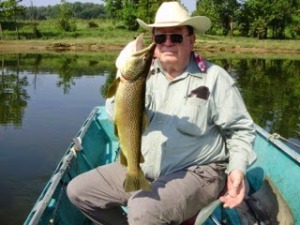 “You take this,” he said. “Use it for whatever you need. Don’t worry about paying me back for it.”
“You take this,” he said. “Use it for whatever you need. Don’t worry about paying me back for it.” my best to step into Dusty’s shoes and encourage new writers, do my best to help them set their feet on the path he helped so many travel, including me.
my best to step into Dusty’s shoes and encourage new writers, do my best to help them set their feet on the path he helped so many travel, including me.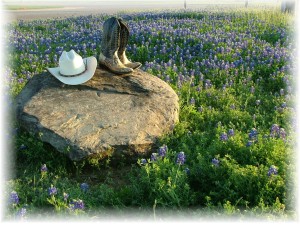 Hold a spot for me at that campfire. I want to hear more stories.
Hold a spot for me at that campfire. I want to hear more stories.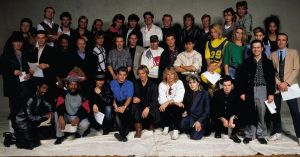 shall remain nameless, goes wall-to-wall, twenty-four-hour with holiday cheer. I avoid it like the plague). The station I’ve been listening to the most plays classic hits, so naturally, one of those songs during this season is
shall remain nameless, goes wall-to-wall, twenty-four-hour with holiday cheer. I avoid it like the plague). The station I’ve been listening to the most plays classic hits, so naturally, one of those songs during this season is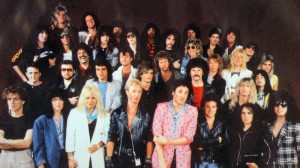 Aid, the heavy metal charity song organized by Ronnie James Dio—and thought it was okay. I mean, I was into metal at the time, so anything that smacked of pop music was too commercial, even if it was put together by Bob Geldof.
Aid, the heavy metal charity song organized by Ronnie James Dio—and thought it was okay. I mean, I was into metal at the time, so anything that smacked of pop music was too commercial, even if it was put together by Bob Geldof. starving kids really look. Evidently, someone somewhere in some marketing department said, “Yeah, that one there? The one that has flies in its eyes and the skinny arms and big belly? He looks too pathetic. Now that one, the one who can still stand up? Use that one. It’ll elicit more sympathy.”
starving kids really look. Evidently, someone somewhere in some marketing department said, “Yeah, that one there? The one that has flies in its eyes and the skinny arms and big belly? He looks too pathetic. Now that one, the one who can still stand up? Use that one. It’ll elicit more sympathy.” Yes, I’m poking fun. A quick Google search reveals that it apparently does snow in parts of Ethiopia, so I’m kind off-point here, but I’m honest enough to admit it. Even so, when you picture Africa, do you picture snow? As I thought about this, I thought it might be more common for it to snow in South Africa, but I doubt snow is commonplace on the continent at large, so my dig at the song still applies, in my mind. After all, they’re addressing Africa itself in that particular lyric, right?
Yes, I’m poking fun. A quick Google search reveals that it apparently does snow in parts of Ethiopia, so I’m kind off-point here, but I’m honest enough to admit it. Even so, when you picture Africa, do you picture snow? As I thought about this, I thought it might be more common for it to snow in South Africa, but I doubt snow is commonplace on the continent at large, so my dig at the song still applies, in my mind. After all, they’re addressing Africa itself in that particular lyric, right?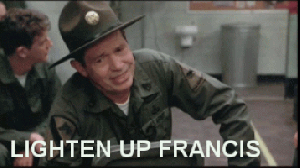
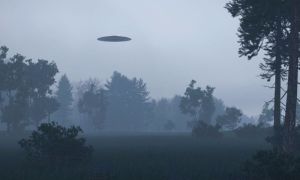 One of those areas is UFOs.
One of those areas is UFOs.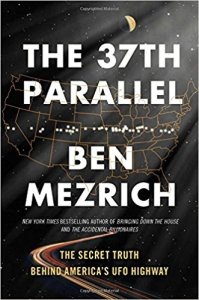 finished one titled The 37th Parallel: The Secret Truth Behind America’s UFO Highway by Ben Mezrich.
finished one titled The 37th Parallel: The Secret Truth Behind America’s UFO Highway by Ben Mezrich. Mr. Zukowski reminds me of Richard Dreyfuss’s character in Close Encounters of the Third Kind. He’s obsessed by this stuff to the point of moving his family from California to Colorado in order to be closer to the scenes so he can investigate them sooner. In other words, get there while the bodies are still fresh.
Mr. Zukowski reminds me of Richard Dreyfuss’s character in Close Encounters of the Third Kind. He’s obsessed by this stuff to the point of moving his family from California to Colorado in order to be closer to the scenes so he can investigate them sooner. In other words, get there while the bodies are still fresh.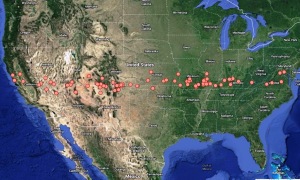 mutilations, along with the locations of most major military bases and American Indian holy sites, are roughly centered along the 37th parallel.
mutilations, along with the locations of most major military bases and American Indian holy sites, are roughly centered along the 37th parallel. enjoy something from our past only to wonder what in the world we saw in it. One of those items for me is the series The Dukes of Hazzard, a show I watched avidly as a young teen, though interest in it waned as I grew older—and as the show began to outlive its original creativeness. I don’t think I watched hardly any episodes after John Schneider and Tom Wopat—Bo and Luke Duke, respectively—briefly left the show to be replaced by their cousins… who also happened to have blond and brown hair. I can’t even remember the cousins’ names, which is probably just as well.
enjoy something from our past only to wonder what in the world we saw in it. One of those items for me is the series The Dukes of Hazzard, a show I watched avidly as a young teen, though interest in it waned as I grew older—and as the show began to outlive its original creativeness. I don’t think I watched hardly any episodes after John Schneider and Tom Wopat—Bo and Luke Duke, respectively—briefly left the show to be replaced by their cousins… who also happened to have blond and brown hair. I can’t even remember the cousins’ names, which is probably just as well. Way back longer ago than even the Dukes, a movie came out called The Life and Times of Grizzly Adams, starring Dan Haggerty in the title role. Mr. Haggerty—according to what I found about him on Wikipedia—led quite an exciting life, being an animal wrangler for many movies. Like the character he played in the movie—and the later TV series—he had a way with animals.
Way back longer ago than even the Dukes, a movie came out called The Life and Times of Grizzly Adams, starring Dan Haggerty in the title role. Mr. Haggerty—according to what I found about him on Wikipedia—led quite an exciting life, being an animal wrangler for many movies. Like the character he played in the movie—and the later TV series—he had a way with animals. who later played Uncle Jesse on The Dukes of Hazzard)? What, exactly, did he do? He visits Grizzly on a regular basis, always griping at and threatening the mule he called Old Number 7—because that was his seventh mule, presumably—a pack animal he never rode, and whose character evidently existed solely to bring supplies from down below to Grizzly—and provide some comic relief.
who later played Uncle Jesse on The Dukes of Hazzard)? What, exactly, did he do? He visits Grizzly on a regular basis, always griping at and threatening the mule he called Old Number 7—because that was his seventh mule, presumably—a pack animal he never rode, and whose character evidently existed solely to bring supplies from down below to Grizzly—and provide some comic relief. That love was only enhanced later when I saw movies like Jeremiah Johnson and The Mountain Men, and even the recent movie The Revenant.
That love was only enhanced later when I saw movies like Jeremiah Johnson and The Mountain Men, and even the recent movie The Revenant. sucker for good artwork. Most of the cards my family received during the seventies were very atmospheric—sleighs, snow-laden trees, houses covered with snow, their windows glowing buttery yellow with warm light. Some had actual glitter on them to make them sparkle, and I can still remember their rough texture under my fingers. Wreaths adorned them, and so did Santa in hundreds of poses—though usually laughing, sometimes with kids around him, sometimes standing in a room lit only by flames in the fireplace as he ate milk and cookies left out by the more thoughtful families.
sucker for good artwork. Most of the cards my family received during the seventies were very atmospheric—sleighs, snow-laden trees, houses covered with snow, their windows glowing buttery yellow with warm light. Some had actual glitter on them to make them sparkle, and I can still remember their rough texture under my fingers. Wreaths adorned them, and so did Santa in hundreds of poses—though usually laughing, sometimes with kids around him, sometimes standing in a room lit only by flames in the fireplace as he ate milk and cookies left out by the more thoughtful families. I hope you have a Merry Christmas, full of joy and love…
I hope you have a Merry Christmas, full of joy and love… As a human being, seeing all these sexual assault cases in the news lately is… disheartening to say the least.
As a human being, seeing all these sexual assault cases in the news lately is… disheartening to say the least. am… I don’t even know a strong enough word to convey my feelings.
am… I don’t even know a strong enough word to convey my feelings. But here’s the thing: to continue with my example, let’s say the Matt Lauer thing goes to court, and it’s clearly shown he was innocent. What then? His reputation is already besmirched because we’ve convicted him in the People’s Court of Social Media. He can’t get a job doing anything remotely like he was doing when NBC fired him sight unseen. Because the People’s Court of Social Media never closes. It’s open 24/7, and there’s no lack of people out there who will disbelieve any amount of evidence they’re shown (witness Flat Earthers, if you doubt).
But here’s the thing: to continue with my example, let’s say the Matt Lauer thing goes to court, and it’s clearly shown he was innocent. What then? His reputation is already besmirched because we’ve convicted him in the People’s Court of Social Media. He can’t get a job doing anything remotely like he was doing when NBC fired him sight unseen. Because the People’s Court of Social Media never closes. It’s open 24/7, and there’s no lack of people out there who will disbelieve any amount of evidence they’re shown (witness Flat Earthers, if you doubt).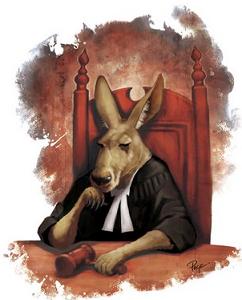 next person could be you.
next person could be you. This week, they reviewed a book called A World Without
This week, they reviewed a book called A World Without  ignore what we were taught—or, in her words, “…feel a sense of relief and freedom from the sort of rules that have been ingrained in us since grammar school”—and just go with what your heart tells you.
ignore what we were taught—or, in her words, “…feel a sense of relief and freedom from the sort of rules that have been ingrained in us since grammar school”—and just go with what your heart tells you. Look, keeping up with the times is all well and good. For instance, when it first surfaced, the word email was hyphenated: e-mail. In fact, if I remember correctly, it was also capitalized: E-mail. Now, the more commonly accepted spelling is email, though there are still those who hyphenate it. Which is fine and dandy. Just pay attention to the publication’s style guide.
Look, keeping up with the times is all well and good. For instance, when it first surfaced, the word email was hyphenated: e-mail. In fact, if I remember correctly, it was also capitalized: E-mail. Now, the more commonly accepted spelling is email, though there are still those who hyphenate it. Which is fine and dandy. Just pay attention to the publication’s style guide. I know: it sounds like a report you’d have to do in school, like the dreaded and mythological “What I Did With My Summer Vacation.” I don’t remember actually writing one of those on that subject, so this is me making up for it… sorta. Don’t worry. I’ll try to keep it from actually being boring.
I know: it sounds like a report you’d have to do in school, like the dreaded and mythological “What I Did With My Summer Vacation.” I don’t remember actually writing one of those on that subject, so this is me making up for it… sorta. Don’t worry. I’ll try to keep it from actually being boring. To be fair, I did go to Germany for forty-five days in 1984 for an exercise called REFORGER, Armyspeak for Return of Forces to Germany—basically practicing for the Soviets invading Europe through the Fulda Gap. And I made two trips to Fort Irwin, California for OPFOR—Opposing Forces—training. Of a sort. We were observers. Fort Irwin and OPFOR used the tactics and vehicles of the Soviets for our units to go into mock combat against. From what I understand, OPFOR won every time. Not sure what that says about the readiness of our troops in the eighties. Probably a good thing we didn’t go to war with Russia.
To be fair, I did go to Germany for forty-five days in 1984 for an exercise called REFORGER, Armyspeak for Return of Forces to Germany—basically practicing for the Soviets invading Europe through the Fulda Gap. And I made two trips to Fort Irwin, California for OPFOR—Opposing Forces—training. Of a sort. We were observers. Fort Irwin and OPFOR used the tactics and vehicles of the Soviets for our units to go into mock combat against. From what I understand, OPFOR won every time. Not sure what that says about the readiness of our troops in the eighties. Probably a good thing we didn’t go to war with Russia.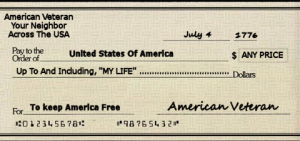 you’re writing a blank check on your life, payable at any time during your service, payment to include death, if necessary.
you’re writing a blank check on your life, payable at any time during your service, payment to include death, if necessary.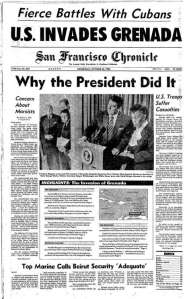 It could have been me going to Grenada. I could have been called up for something, who knows? You join during peacetime, but you never know what can happen in this world. Just ask those guys who were in those barracks in Lebanon in the early eighties. Or, more recently, the recruiters who were shot while simply standing on the sidewalk. Here in America. You shouldn’t have to worry about being shot while you’re a recruiter.
It could have been me going to Grenada. I could have been called up for something, who knows? You join during peacetime, but you never know what can happen in this world. Just ask those guys who were in those barracks in Lebanon in the early eighties. Or, more recently, the recruiters who were shot while simply standing on the sidewalk. Here in America. You shouldn’t have to worry about being shot while you’re a recruiter.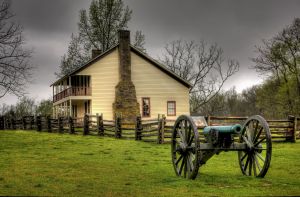 Tavern—a distance we covered in mere minutes in my pickup—to join the main battle. It took them ALL NIGHT to march perhaps four miles. I stood on the ground where those men fought and bled and died, all within sight of the tavern, on a cold March day in 1862. The weather was chilly, and it helped a bit to relate.
Tavern—a distance we covered in mere minutes in my pickup—to join the main battle. It took them ALL NIGHT to march perhaps four miles. I stood on the ground where those men fought and bled and died, all within sight of the tavern, on a cold March day in 1862. The weather was chilly, and it helped a bit to relate.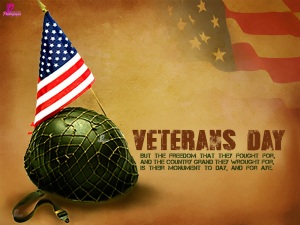 I’ll close by saying a big, belated thank you to all those who went into harm’s way to serve, who went farther down that trail than I did so that I can remain free.
I’ll close by saying a big, belated thank you to all those who went into harm’s way to serve, who went farther down that trail than I did so that I can remain free.